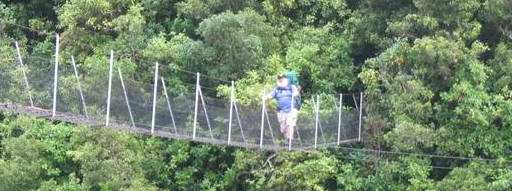A few years ago now, in the early nineties, I assisted with the production of a book called "First Do No Harm: The Sexual Abuse Industry". Felicity Goodyear, the author, is a doctor and practising feminist who had pioneered work with rape victims in New Zealand. She wrote the initial police handbook for doctors dealing with rape victims and helped to set up Auckland's HELP Foundation to provide counselling assistance. In fact, she was founder president.
As time passed she became more and more doubtful about the manner in which sexual abuse counselling was being conducted, especially in relation to children. A psychologist, the partner of an Auckland judge, was quoted in the New Zealand Herald as saying that it was better ten innocent men went to jail than that one child abuser should go free, and this was fairly typical of the hysteria surrounding sexual abuse in the eighties and early nineties. Unfortunately, many innocent men did find themselves in prison.
Defending oneself was an impossibility. Pleading not guilty was evidence only that you were in denial, and sentences were typically much heavier on those who dared to defend themselves. They were rarely believed, in the face of the most outrageous accusations. Children never lied about sexual abuse. (And wives separating from their husbands never lied either!!) Kellogg's old list of symptoms that proved your child was masturbating, was trotted out and used as an indicator that sexual abuse had occurred.
The social atmosphere was such that any professional who dared to question this professional "wisdom" was likely to be without a job, and certainly without any kind of government agency work. To question anything going down was to reveal oneself as at best a supporter of child sexual abusers, and possibly a closet child sexual abuser oneself.
And almost any "interviewing" technique was legitimate if it produced conscious "memories" of the sexual abuse that must necessarily have occurred. I mentioned the belief that "children never lied about sexual abuse". I need to qualify this. If children denied that it had happened they were almost certainly lying or had "suppressed" memories of the event.
Other possible sources of trauma were rarely considered. To a cynical observer, they were, in any case, closer to the present and more subject to reality check. Even supposedly "academically qualified" and "trained" professionals lent themselves to this paradigm.
Counsellors worked for weeks to "elicit" the "buried memories" from small children. Interviews, in classic brainwashing style, often went on for hours and hours, day after day, until finally daddy or uncle or grandad was identified as an abuser. Even dogs took less time to train. Felicity's book details these techniques and quotes in depth from videos taken of disclosure interviews. It is an intensely disturbing picture.
As recently as 1991, a survey of therapists on this issue revealed that as many as 93% believed in the authenticity of the recovered memories that they heard from their clients (Bottoms, Shave & Goodman, 1991).
In the circumstances, Felicity's book required monumental courage to produce. Many booksellers refused to stock it for fear of the possible backlash. Feminist bookshops barred it completely. But it was the beginning of a turnaround that had to come - a slow turnaround. Gradually more and more counsellors came to accept that Kellogg's list of symptoms was as flaky as his breakfast food, and caused by something other than sexual abuse.
A new syndrome, called "post-traumatic stress disorder" appeared in the text books, a small advance, but often tempered by disguising the old sexual abuse agenda under a different name.
Felicity and her husband John started COSA as a mutual support group for victims of false allegations of sexual abuse. (http://www.menz.org.nz/ ). Felicity's work, in New Zealand and internationally eventually led to her accepting a position in the Dept of Psychiatry & Behavioural Science at the University of Auckland.
"Repressed memories" these days seldom send men to prison as they did in the eighties. Internationally, enough experts have gathered sufficient credibility to challenge them successfully in the courts, and judges are much more circumspect in allowing this type of evidence.
The typical extended family is not after all jampacked with satanists and child sexual abusers, and it is getting to be safe for grandad to hug his grandchildren once more.
If repressed memories are not in fact reliable as evidence in court, what can we say about them. I think we grant them similar status to recalled dreams. Or recovered memories of "past lives", which I believe are equally doubtful as straight information sources. For more on these, see "Memories are made of this..."
References:
Bottoms, B.L., Shaver, P.R. & Goodman, G.S. (1991, August). Profile of ritualistic and religion-based abuse allegation reported to clinical psychologists in the United States. Paper presented at the 99th Annual Convention of the American Psychological Association, San Francisco.
